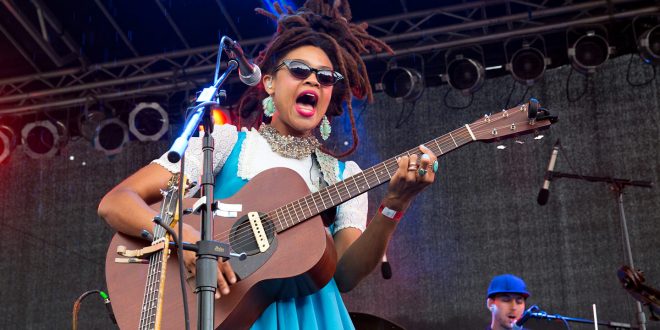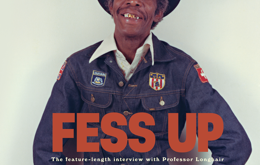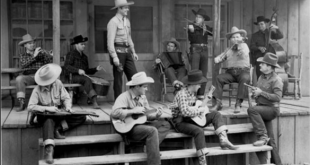“I am in the midst of a great fortune,” Valerie June proclaimed, arms outstretched like an evangelist beseeching sinners to the altar. “The weather is beautiful,” she enthused to a crowd on a Pacific summer evening on the Santa Monica Pier. “The people are beautiful,” she said to (and of) her audience. Ms. June went on like this, piling up examples of great fortune, arms reaching out with each one, till she closed her between-song sermon with “Everything is going to be OK.”
Given the many voices saying we’re riding an express hand basket to Hell, you have to applaud Ms. June’s contrarian optimism. I’m just not sure how much else to applaud about her, since I’m a mite wary of artists who appear to be heavily laced with artifice.
I had hiked to the Pier for the appearance of the legendary Irma Thomas, Soul Queen of New Orleans. There’s nothing put on about Ms. Thomas, who at 76 still has church-forged pipes that can chase devils and raise rafters. Backing her was a solid Crescent City funk band featuring two keyboards: New Orleans is a piano town. So how down home is Ms. Thomas? She sang an a cappella request to a grand daughter down front, praising her to the audience for getting her nursing degree while raising her own daughter. You sense that Irma has family wherever she goes, or creates a sense of family with her natural warmth.
But Irma Thomas fans don’t show up just to get a hug. You want to hear her signature sass on a song that was an R&B hit for her when she was still in her teens, “You Can Have My Husband (But Please Don’t Mess with My Man).” You want to hear her dynamic delivery of one of the great Crescent City Soul ballads, “It’s Raining.” And you want to hear her stops-out performance of “Iko Iko” and other New Orleans R&B-Soul-funk standards which, if not hers originally, she absolutely owns onstage. Does she disappoint? She doesn’t. It had been nearly six years since I last saw Ms. Thomas perform in Golden Gate Park, where she gave a stunning performance that eclipsed anything else I experienced at that year’s Strictly Hardly Bluegrass Festival, peopled with legends (they shall remain nameless). As of the evening of Aug. 3rd anyway, Irma Thomas still fires on all burners, is still a force of nature, is still a voice for the ages.
It seemed a shame she was appearing as opening act before a relatively small crowd at a free concert, part of Santa Monica’s Twilight Dance Series, an annual summer event. As the sun went down the Pier filled up and I stuck around for the headliner, albeit with no expectations. I was only peripherally aware of Valerie June, and had never heard her before.
Ms. June has spectacular hair, explosive plumes of it. I’m less sold on her singing voice, which put me in mind of the qualities that put me off Iris DeMent—a nasal quaver that, in both singers, sounds affected and, over time, irritating. That carried over to Ms. June’s speaking voice, which came across as an odd imitation of Dolly Parton’s speech. A strong dose of Coleridge’s willing suspension of disbelief would have helped me, but instead I kept wondering, “Is this a put on?”
Performers are surely entitled to create personas. Bob Dylan went through a few, and was quoted in Ms. June’s introduction as calling her “the most interesting artist I’ve heard in the past year.” Was Bob praising a kindred spirit? Valerie June, a beautiful young African-American woman originally from Tennessee, seemed to be doing faux hillbilly voices, or so it struck me. I could be wrong: maybe both her speaking and singing voices are genuine. Or maybe they’re versions of the voices in her head.
“Someone was interviewing me backstage,” she said in a between-song monologue, “and they asked, `How did you learn the instrument [guitar]?’ I said, `I just follow the voices.’” Voices taught her guitar? Yes, and her songs, too. “I like to sleep,” she said. “They call me Sleepy June. And I dreamed this song. The voice that sang it to me was like an angel’s, a really high voice.” She then sang the song sans her four-piece band. I couldn’t really make out the lyrics, and the tune wasn’t all that remarkable. But the concept wound me up: is Ms. June, on top of other possible affectations, pretending to be schizophrenic?
Not necessarily, or so a little online research suggests. Evidently hearing voices isn’t especially uncommon, and there are cultural biases in terms of how the experience is interpreted. Some African and Indian cultures consider it a blessing, whereas Americans generally deem it a sign of madness. There are a host of online communities supporting folk who hear voices, replete with assurances that hearing voices doesn’t mean you’re crazy. At least one suggests a strong connection between artistic creativity and hearing voices, an experience reportedly shared by Charles Dickens, Beethoven, and a host of other major league geniuses.
I stop short of including Valerie June in their company, though I did enjoy some of her songs, especially the ones that evoked the hypnotic Mississippi hill country groove she likely heard when living in Memphis. I wish her and her voices well, even if I tend to think, in the natural order of things, she should have been the opener for Irma Thomas. But hats off to Ms. June for her diplomatic put down of an audience member afflicted with echolalia (he was loudly repeating what she was singing): “We all get tired,” she said, “when we’re drunk.”
 Baja Review A community newspaper serving Ensenada, Valle de Guadalupe, and Rosarito in Northern Baja California
Baja Review A community newspaper serving Ensenada, Valle de Guadalupe, and Rosarito in Northern Baja California





